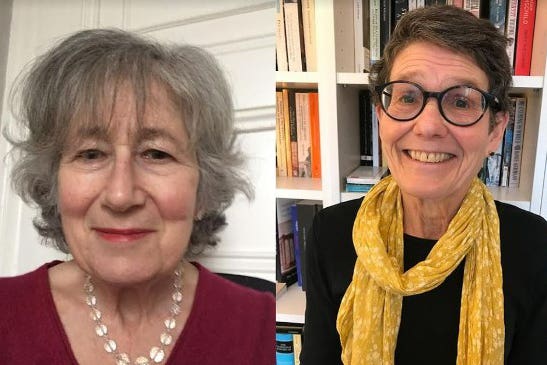Prisoners ‘turn lives around’ by reading behind bars, volunteer made OBE says
Jenny Hartley and Sarah Turvey founded Prison Reading Groups (PRG), which sets up book sessions for inmates.

Your support helps us to tell the story
From reproductive rights to climate change to Big Tech, The Independent is on the ground when the story is developing. Whether it's investigating the financials of Elon Musk's pro-Trump PAC or producing our latest documentary, 'The A Word', which shines a light on the American women fighting for reproductive rights, we know how important it is to parse out the facts from the messaging.
At such a critical moment in US history, we need reporters on the ground. Your donation allows us to keep sending journalists to speak to both sides of the story.
The Independent is trusted by Americans across the entire political spectrum. And unlike many other quality news outlets, we choose not to lock Americans out of our reporting and analysis with paywalls. We believe quality journalism should be available to everyone, paid for by those who can afford it.
Your support makes all the difference.Encouraging prisoners to read books behind bars can help them “turn their lives around”, a volunteer becoming an OBE has said.
Jenny Hartley and Sarah Turvey, who founded Prison Reading Groups (PRG), which sets up book sessions for inmates, have been made OBEs in the King’s Birthday Honours.
Both spoke of being “delighted” at the recognition the charity has received.
Ms Turvey told the PA news agency: “I think what it helps prisoners do more than anything is connect, prisons for the most part are places of isolation and purposelessness.
“By definition, prisons separate prisoners from the outside world, from their families, and in many ways from themselves, there’s also in most prisons not enough to do and very little reason for doing it.
“What we wanted to try to do was to help prisoners turn their lives around, but it seemed to us that crucially important to that project was to help give prisoners a sense of connection and a sense of purpose. I think that’s what our groups do, they connect prisoners with each other within the group.
“They help connect prisoners with their families, in terms of being able to talk about books with their families, they connect prisoners with the outside world with a sense of having an interest in the outside world having a stake in it and the larger culture.
“In many ways, we’re finding a new kind of pro-social identity for themselves, a sense of themselves as something more than a failure with a number, so I think that’s more than anything what we hope our groups do, and, of course, that they increase pleasure and enjoyment of reading itself.”
The charity works with prisoners “across the spectrum”, from maximum security inmates to those in young offender institutions.
There are now 60 groups in 51 prisons across the UK, supported by library staff and volunteers, which meet on average once a month, reaching hundreds of people every year.
Books range from “James Patterson blockbusters to Charles Dickens classics”, Ms Turvey said.
She added: “One of the things someone said that sticks in my mind always is ‘this is the most grown-up discussion I have in prison’.
“Many other people have said ‘it’s the one time in my prison life where I feel people listen to and respect what I have to say’.
“People have talked about the ways in which it’s connected them with their own families, I remember a prisoner saying that he had a 13-year-old daughter, but he’d been inside for a long time, and it had become very hard for them to connect in phone calls or visits.
“And he said ‘now I can tell her I’m a member of the reading group and we can talk about the book I’m reading and it’s made the difference’.
“So I think it fills a space and I think it helps prisoners to rethink themselves in terms of who they are, of what they might have to offer of what they can be and do.
“All of it sounds like very grand claims and a reading group doesn’t do those things on its own, but I think it’s part of the process that really needs to go on if prisoners are going to leave and turn their lives around.”